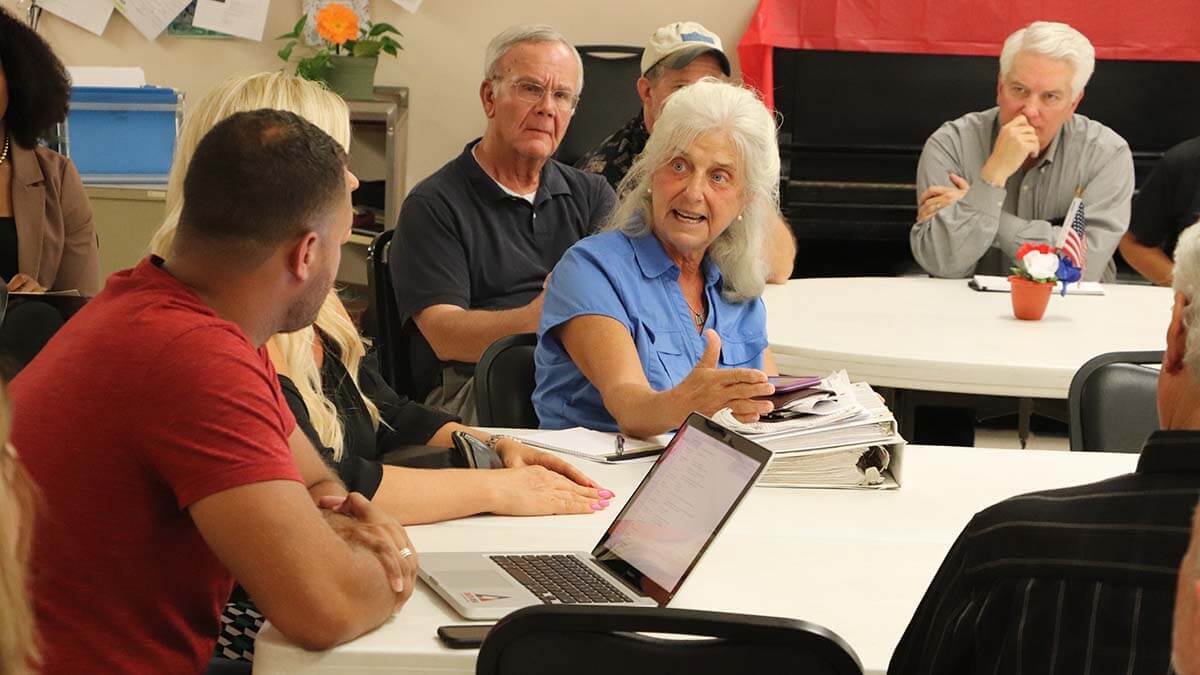
Rather than finding ways to rid homeless services in Dignowity Hill, residents place blame on themselves, claiming they need to do more to assist the homeless in the area.
Dignowity Hill residents and reps from some of the homeless ministries in the area met Thursday night to discuss vagrancy issues. Some residents have complained about some homeless relieving themselves in public, fighting and trespassing.
However, a majority of residents who attended the discussion at the Ella Austin Community Center said they should take on a larger responsibility in helping the homeless.
Representatives from Church Under the Bridge, Catholic Worker House and the Strong Foundation attended the discussion. The Salvation Army and Hope House Ministries did not show.
Brian Dillard, president of the Dignowity Hill Neighborhood Association, organized the roundtable and questioned how effective these organizations could be with a large transient population. He also asked them to keep better tabs on the few who act out.
Dillard requested the Catholic Worker House provide a service to the homeless struggling with mental health, understanding that the organization isn’t equipped to deal with those issues.
Chris Plauche, volunteer director of the Catholic Worker House, said her organization lacks funding to provide those types of services. It’s difficult to keep track of the 250 homeless who stop by the house on a daily basis, she said. Plauche and her volunteers run the shelter from 7 a.m. to 7 p.m. most days.
Dillard said if the ministries attended more of the monthly neighborhood association meetings, residents would feel better being able to ask questions directly to the ministries.
Plauche was hesitant about the idea, saying it was difficult to make time to participate because of the Catholic Worker House’s hours. She attended meetings before, but stopped going after issues regarding homelessness became silent for about a year.
Pastor Dennis Cawthon and associate Pastor Gabriel Martinez of Church Under the Bridge said they are open to having a representative at the monthly neighborhood association meeting. In addition to worship services and Bible study, the church offers a 12-step program, free meals and clothing to those in need.
Dillard said the organizations should intervene in cases of misconduct. However, residents defended the ministries and said the San Antonio Police Department’s job is to police the area.
Pastor Jim Gipson, executive director of the Strong Foundation, said not all problems or issues in the neighborhood are perpetuated by homeless people.
“Not everything that happens is because of the ministries that are here,” Gipson said.
“We don’t know what’s happening if you don’t call and let us know,” said Sgt. Dean Reuter with SAPD.
Reuter said even if there isn’t a case, the police department can document the incident, which helps pinpoint areas where crime rates might be common.
Dignowity Hill resident Devin Verdon, 50, said the neighborhoods should volunteer and visit the ministries to better understand the services they provide.
“My wife and I moved into this neighborhood knowing what we were getting into. These ministries are not to blame, they are not responsible,” Verdon said to a reaction of approval from the residents in attendance. “They are not responsible in recruiting us to volunteer for them, we are to go to them to volunteer.”
Verdon said when he first moved into the neighborhood in October he and his wife made peanut butter and jelly sandwiches to distribute to the homeless in the area. The homeless refused the sandwiches for fear that they were poisoned, as it had supposedly happened before.
“It’s the dignity factor … these people need to feel like we care about them,” Verdon said. “We need to be a part of the solution that starts with us.”
“It all starts with building trust,” Plauche of the Catholic Worker House added.
Dillard believes the discussion, which wasn’t an official neighborhood association event, was successful in creating a line of communication between residents and the homeless services.
“Our next step is to go to (the ministries and nonprofits) as a community,” Dillard said after the roundtable. “On the neighborhood association side, we’re going to let our residents know of volunteer opportunities, but it’s going to be a two-way street.”
This article was originally published by the H.E. Butt Foundation’s Folo Media initiative in 2017.